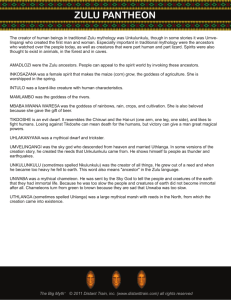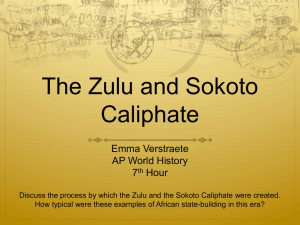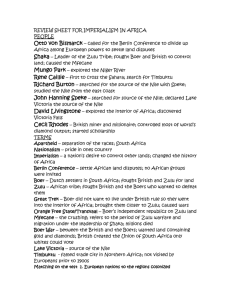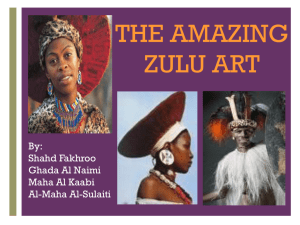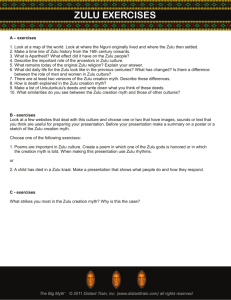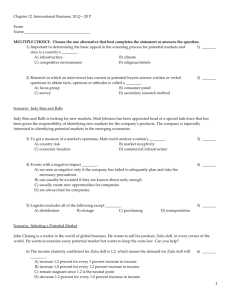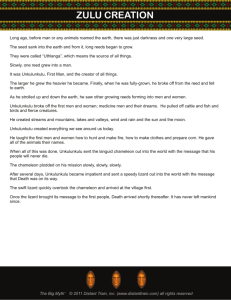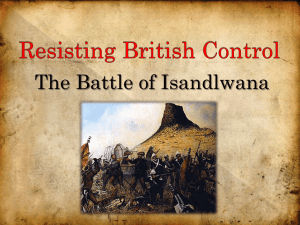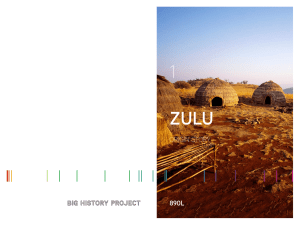Lord of the Sky - King of the Earth. The Zulu High God
advertisement
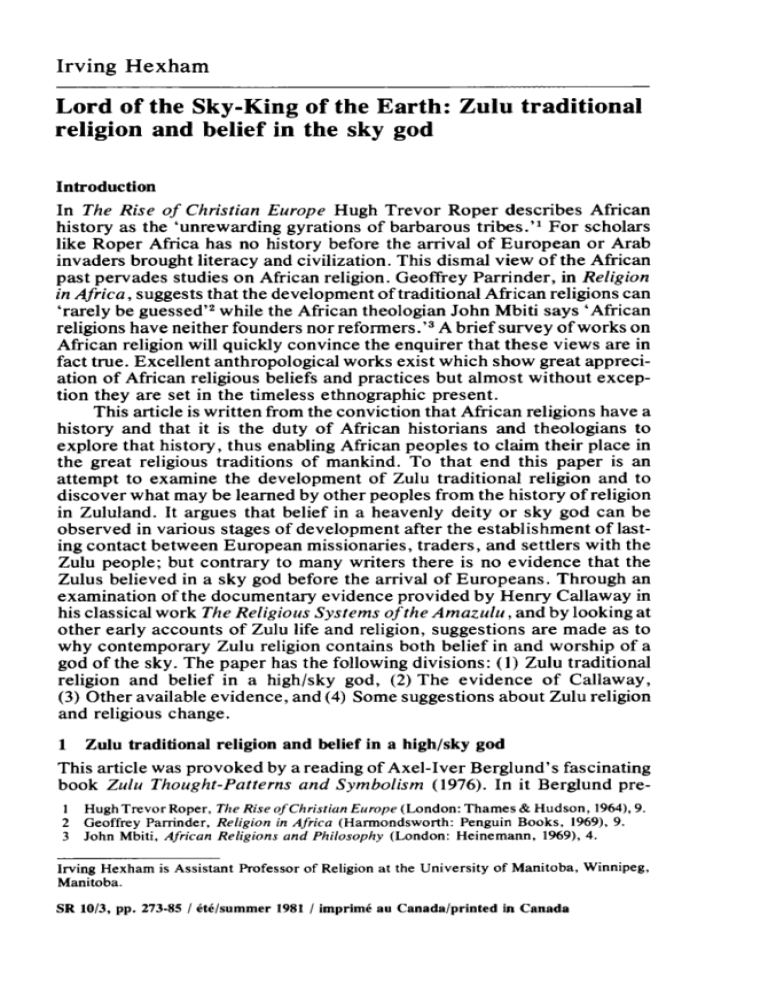
Irving Hexham Lord of the Sky-King of the Earth: Zulu traditional religion and belief in the sky god Introduction In The Rise of Christian Europe Hugh Trevor Roper describes African history as the ’unrewarding gyrations of barbarous tribes.&dquo; For scholars like Roper Africa has no history before the arrival of European or Arab invaders brought literacy and civilization. This dismal view of the African past pervades studies on African religion. Geoffrey Parrinder, in Religion in Africa, suggests that the development of traditional African religions can ‘rarely be guessed’2 while the African theologian John Mbiti says ‘African religions have neither founders nor reformers. 13 A brief survey of works on African religion will quickly convince the enquirer that these views are in fact true. Excellent anthropological works exist which show great appreciation of African religious beliefs and practices but almost without exception they are set in the timeless ethnographic present. This article is written from the conviction that African religions have a history and that it is the duty of African historians and theologians to explore that history, thus enabling African peoples to claim their place in the great religious traditions of mankind. To that end this paper is an attempt to examine the development of Zulu traditional religion and to discover what may be learned by other peoples from the history of religion in Zululand. It argues that belief in a heavenly deity or sky god can be observed in various stages of development after the establishment of lasting contact between European missionaries, traders, and settlers with the Zulu people; but contrary to many writers there is no evidence that the Zulus believed in a sky god before the arrival of Europeans. Through an examination of the documentary evidence provided by Henry Callaway in his classical work The Religious Systems of the Amazulu, and by looking at other early accounts of Zulu life and religion, suggestions are made as to why contemporary Zulu religion contains both belief in and worship of a god of the sky. The paper has the following divisions: (1) Zulu traditional religion and belief in a high/sky god, (2) The evidence of Callaway, (3) Other available evidence, and (4) Some suggestions about Zulu religion and religious change. religion and belief in a high/sky god This article was provoked by a reading ofAxel-Iver Berglund’s fascinating book Zulu Thought-Patterns and Symbolism (1976). In it Berglund pre1 Zulu traditional 1 2 3 Hudson, 1964), 9. Hugh Trevor Roper, The Rise of Christian Europe (London: Thames & Geoffrey Parrinder, Religion in Africa (Harmondsworth: Penguin Books, 1969), 9. John Mbiti, African Religions and Philosophy (London: Heinemann, 1969), 4. Irving Hexham Manitoba. is Assistant Professor of Religion at the University of Manitoba, Winnipeg, 274 sents compelling evidence for the existence of a coherent Zulu religious system which involves the worship of a heavenly being, the Lord-of-the- Sky. Yet in presenting his evidence Berglund repeatedly acknowledges that this belief is not apparent in earlier studies of Zulu religion. Thus he can say: ’Reading studies by Callaway, one is given the impression that Zulu of his time made no clear distinction between a sky divinity and the shades.’4 and ’Evidence collected shows very clearly that among Zulu there is a conception of heavenly divinities.... If there has been hesitation on the issue previously-early literature seems to suggest this-no Zulu today hesitates to accept and dogmatise on a belief in &dquo;God who is in heavens5 Exactly how Berglund views this ’evidence’ is unclear. The reader is left with the feeling that in accepting that there is no historical evidence for belief in the Zulu sky-god, Berglund nevertheless believes that such a belief existed and that earlier scholars misunderstood Zulu religion. Such an impression is supported by his constant use of the statement ’Zulu are emphatic’ and similar ways of underlining his argument, his stress on the reliability and age of informants, the suggestion made on page 42 that ’the now obsolete annual festival of first-fruits’ was ’an integral part of the worship of the Lord-of-the-Sky,’ and by various linguistic arguments which open to doubt the value of earlier studies. This impression is further strengthened by reading footnotes 11 and 12 in chapter two where it is strongly suggested that in the past the Zulu’ definitely have had a God in the sky.’ After reading Berglund’s arguments it seems that what he is in fact portraying is not simply contemporary Zulu religion but Zulu religion as it has always been for the Zulu. Should any doubts remain about Zulu traditional religion, an examination of Eileen Krige’s The Social System of the Zulus (1936), Schapera’s The Bantu Speaking Tribes of South Africa (1937) and Smith’s African Ideas of God (1950) will appear to confirm the fact that belief in a sky deity is and always has been central to Zulu religious thought. Krige says: ’Unkulunkulu (the old, old one) is the Creator of First Cause. If a Zulu is asked about the origin of man and the world, he will say Unkulunkulu made all things.... In addition to Unkulunkulu the Zulus believe in a power which they call &dquo;Heaven&dquo; or &dquo;The Lord of Heaven&dquo; ....’s W. M. Eiselen and I. Schapera argued that ‘all the Bantu further have some conception, generally rather vague, of a supreme power .... The Zulu have a sky god... &dquo;the Lord of Heaven.&dquo;’’ Equally adamant is Edwin Smith in African Ideas of God where, speaking about the Zulu, he says: ’Unkulunkulu was spoken of as Creator; but the hint seems to be conveyed that he made things below, as the slave of the Lord above who created the great things which exist and come from the sky.’8 So he, too, argues strongly for 4 5 6 7 8 Axel-Iver Berglund, Zulu Thought-Patterns and Symbolism (Cape Town: David Philip, 1976), 32. Ibid., 383. Eileen Krige, The Social System of the Zulus (Pietermaritzburg: Shuter & Shooter, 1936), 280 and 282. I. Shapera (ed.), The Bantu Speaking Tribes of South Africa (Cape Town: Masken Miller, 1937), 262-63. Edwin W. Smith (ed.), African Ideas of God (London: House Press, 1950), 108. 275 the Zulu belief in the Lord of Heaven whom he sees as greater than the archetypal ancestor Unkulunkulu and whom he suggests was spoken of in awe and referred to as the Lord of Heaven because, like the Jews of Jesus’ day the Zulus thought the name of God too sacred to utter. More recently in The Bantu-Speaking Peoples of Southern Africa (1974), Hammond-Tooke has supported this position when he states that ’The Zulu also seem to have a personified Sky God, other than Unkulunkulu’9 and, as one would expect, John Mbiti makes great play of the Zulu belief about God in heaven. 10 In a similar way Bolaji Idowu uses evidences about the Zulu belief in a Lord of Heaven to comment upon African ideas of justice. 11 Quite clearly the existence of a Zulu belief in a sky deity, The Lord of Heaven, is well established in the literature on both the Zulus in particular and African religions in general. When this evidence is examined in detail one quickly discovers that where a source is cited for this belief it is Henry Callaway’s The Religious System of the Amazulu which was first published by Callaway in 1870 with an English translation, notes, and comments on his informants. Thus Krige, Schapera, and Smith all acknowledge Callaway as their source while Mbiti quotes Smith. Hammond-Tooke and Idowu fail to cite their authorities but cite examples given by Callaway. This being the case, a careful analysis of Callaway’s evidence is obviously essential for an understanding of Zulu statements about God. When this is carried out, it comes as a surprise to discover that the statements given by Callaway say very different things from the use of them by later writers. 2 The evidence of Callaway Two main expressions are taken up by later writers in their discussion of Zulu religion: these are Unkulunkulu and the Lord of Heaven. The majority of writers pay most attention to Unkulunkulu while Berglund develops the significance of The Lord of Heaven at great length. Callaway has 104 pages of text devoted to Unkulunkulu, 11 to Utikxo (a term dismissed by later writers), and 8 to The Lord of Heaven. In addition it is important to note that the idea of a Lord of Heaven occurs on a number of occasions in his general discussion of Unkulunkulu. Callaway argues, and later writers seem to agree, that Unkulunkulu can be understood as meaning ’the old-old one.’12 Later Callaway adds a very important note in which he says: interpreter to Mr. Owen, in 1837. He says the word Unkulunkulu amongst the natives; but that Captain Gardiner introduced it to express the Greatest, of the Maker of men. Mr. Hully refused to use it in this sense. He allowed that the word kulu meant great, but denied that Unkulunkulu existed in the language to express that which Captain Gardiner wished.13 Mr. Hully, a missionary was not then in use ... Hammond-Tooke, The Bantu Speaking Peoples of Southern Africa (London: Routledge & Kegan Paul, 1974), 321. 10 Mbiti, African Religions (see n. 3 above), 49, 52-54. 11 Bolaji Idowu, African Traditional Religion (London: SCM Press, 1973), 164. 12 Henry Callaway, The Religious System of the Amazulu (London: Folklore Society, 9 13 W. D. 1870), 1, note 1. Ibid., 54, note 3. 276 This statement is perhaps the key to some of the obvious confusion in the minds of Callaway’s informants when they talked about Unkulunkulu. Again and again there is ambiguity and hesitation in their accounts. Thus one informant could say, ’The old men say ... they did not know Unkulunkulu.’14 And another said, ’The ancients used to say before the arrival of the missionaries that all things were made by Umvelinquangi; but they were not acquainted with his name. But they lived by worshiping snakes ....’15 Yet another added, ’So finally we hear that Unsondo is, as it were, a man .... Unsondo is the same as Unkulunkulu, who we say dies ....’16 As one reads the texts it becomes clear that if Unkulunkulu had any meaning at all prior to Gardiner’s use of the term it was as a name or way of referring to an early ancestor which carried with it no implications of deity. That they worshipped or could possibly worship Unkulunkulu was denied repeatedly by Callaway’s informants .17 Callaway also admits that he often had difficulty getting information about Unkulunkulul8 and in doing so makes it clear that in collecting his information he and his helpers asked questions of their informants which were designed to elicit a response that assumed the Zulus had a belief in a high god. Thus, as one reads the texts and attempts to see the question which the informant was asked to answer, one is struck by the desire of informants to give the answers which they believed were sought: ’Two natives, perfect strangers... overheard what I was saying.... I asked what he knew of Unkulunkulu; He replied ....’19 Here Callaway admits the Africans knew the answers he sought before he talked to them. One informant gives the clue to the origins of Zulu beliefs about Unkulunkulu: ’We used to hear it said by our fathers, they too having heard it from others.... ’20 The significance of ’having heard it from others’ becomes clearer when statements by Callaway like the following are taken into account: ’This is a very common occurrence. Very old Amazulu, when asked to speak about Unkulunkulu, are apt to speak not of the first Unkulunkulu, but the Unkulunkulu of their tribes.’21 What he means by this is that old Zulu would not speak of a ’first’ or creator but simply of their tribal ancestors. In reporting the response of one old woman we read: ’Truly Unkulunkulu is he who is in heaven. And the whitemen, they are the lords who made all things.’22 Here Unkulunkulu and whitemen are linked together with the idea of creation. This association becomes understandable when it is realized that if Unkulunkulu was thought of as the first ancestor, he would be the one who, according to Zulu mythology, had created the nation by giving it its basic technology. Thus, just as Unkulunkulu had provided the original Zulu with fire and iron weapons, so too whitemen had begun to provide them with guns and other products which were changing their way of life. Another informant whose conversation Callway records seems to confirm this interpretation by saying: 14 15 16 17 18 Ibid., Ibid., Ibid., Ibid., Ibid., 7-8. 10. 14-15. 16-17, 25, and 34. 33. 19 20 21 22 Ibid., 39-40. Ibid., 45. Ibid., 54. Ibid., 55. 277 And when I enquired, saying ‘Do not your teachers tell you that the lord which is in heaven is Unkulunkulu?’ he replied with a start, ’Hau! by no means. I have never heard such a word, neither did I ever hear them mention the name. It is your teacher alone with whom I have ever spoken its The teacher in this case was Callaway himself as he admits in a footnote. The same informant waxed lyrical about the superiority of the whitemen over blacks and said that ’Now they [whitemen] tell us all things ....’24 Another missionary quoted by Callaway told him: ’Since you were here I have questioned the bearer about Unkulunkulu, as also others. But unless I first give them the idea, they know very little or nothing about it...’25 (italics mine). It is clear then that sufficient evidence is available in Callaway’s texts to show that the Zulu usage of Unkulunkulu in his time had a primary meaning of ancestor and the overtones of a Christian view of God that it gained came, according to his informants, from Europeans both through direct teaching and in response to the sort of questions which they were constantly asking Zulus about their religious beliefs. Turning to the term Utikxo, Callaway has no hesitation in saying that it was ’a word adopted for God by the early missionaries among the Kxosa or Frontier Kafirs.... And it is generally supposed that the word does not properly belong to the Kxosa or any other of the alliterative dialects spoken in South Africa; but has been derived from the Hottentots.’26 The remainder of his discussion of Utikxo is as to its meaning amongst the Khoi-San peoples and as to whether or not it really had the connotations of deity understood by the missionaries in their use of it. His shortest discussion is reserved for the notion of The Lord of Heaven. Several times in discussing Unkulunkulu informants mentioned a heavenly Lord who seemed similar to the Christian God. And, indeed, it is this heavenly Lord which Berglund finds to be more important to contemporary Zulu than the rather vague figure of Unkulunkulu. Before studying the section in the texts which Callaway devoted to the Lord of Heaven it is worth reviewing the evidence about this being recorded in his discussion of Unkulunkulu. The first reference to the idea comes on page 10 where an informant says, ’When we were with the Dutch they did not tell us that there is a Lord above; but said that we black people should be burnt and that we have no spirit, but are like a dog, which has no spirit.’2’ Later, however, another informant said: ’And the King which is above we did not hear of him (first) from whitemen. In summer time, when it thunders, we say, &dquo;The King is playing ....&dquo; This is why I say, that the Lord of whom we hear through you, we had already heard of before you came.’Z8 The same informant went on to distinguish between the heavenly king and Unkulunkulu and insisted that while Unkulunkulu was the creator of men, he died, unlike the heavenly king who reigns above.29 The third reference to the heavenly Lord 23 24 25 26 Ibid., 62-63. Ibid., 79. Ibid., 86. Ibid., 105. 27 28 29 Ibid., 10. Ibid., 19. Ibid., 21. 278 came from an informant who claimed that the heavenly Lord was the creator of the world.3° A fourth informant, an old woman, began by denying that Unkulunkulu had gone ‘above’ to become the ‘creator which is in heaven.’31 The fifth informant to mention a Lord in Heaven was careful to distinguish him from Unkulunkulu32 who was said to be the creator of men and of human social institutions but could not be spoken of as a lord.33 The sixth informant He said: emphatically denied that the lord of heaven was the Zulu god. The ancients said that it was Unkulunkulu who gave origin to men, and to everything else besides, both cattle and animals. They said it was an ancient man who gave origin to these things, of whom it is now said that ancient man is lord; it is said, he is the Lord which is above. We have not heard from you that the Lord which is above made everything. The old men said that Unkulunkulu was an ancestor and nothing more .... 34 The same informant told of how the efforts of a missionary so impressed the people that they ultimately came to accept and use the term Utikxo as referring to a being who was above. But the informant adds: ’we used to speak of the whole heaven, saying &dquo;Utikxo dwells in the whole heaven&dquo; but did not clearly understand what we meant.’35 The seventh and final reference to the Lord of Heaven in this section comes in a very confused dialogue where the informant at first denies that he knows Unkulunkulu and then says that he points to heaven and says, ’There is Unkulunkulu.’3s In commenting on this Callaway says that at first he had not intended to use this piece of evidence but later thought that when the informant denied knowledge of Unkulunkulu he was in fact speaking of the first man, while when he again acknowledged Unkulunkulu he was speaking of the ancestor of his tribe or clan. In this incident, as with the other reports, the reader is left in confusion about both Unkulunkulu and the Lord of Heaven. When Callaway turns to a discussion of the Lord of Heaven, the information he gives throws light on the entire debate. Callaway begins his discussion with a general discussion of belief in a heavenly lord amongst the nations of the earth. In this, as in many footnotes, he shows both his wide reading and interest in the comparative religion of his day. He also lays bare his own predisposition to believe that all men everywhere believe in a god who is in heaven. 37 Having done this he records the comments of his informants without apparently realizing exactly what they are saying or the implications of their statements for an understanding of the development of religious ideas amongst the Zulu. His first informant is quite explicit when he says: It is by no means clear what is really said about the lord of heaven. For when the heaven It is not very clear which is (lightning) has struck any place, it is said, ’The lord is angry.’ the lord that strikes-whether it is the lightning, or whether the lightning is the lord’s ... power.... But there 30 31 32 33 34 Ibid., Ibid., Ibid., Ibid., Ibid., 50. 53-55. 56. 59. 63. are many who are called lords 35 36 37 38 by men .... 38 Ibid., 69. Ibid., 83. Ibid., 117. Ibid., 118. 279 The same informant went on to say: It is not permitted that there should be any greater than the chief. The greatness of heaven was said to belong to Upanga, who was a great Zulu chief; for you can see by this that it is merely something done for the purpose of exalting a man when it said that the heaven too belongs to him. It used to be said if any omen happened to a village, that it was occasioned by the chief... ’it was done by heaven’ ... and the people understood ... it is a mere exaltation of the chief.3a Another informant told him: Among the Amazulu they use the name of heaven; when it thunders they say, ’The heaven of the chief thundered.’ They do not mean the owner of the heaven who made it, but a mere man who is chief; he is exalted by saying the heaven is his.... They say this because they see no one else but the chief himself, who if he chooses can command any particular person to die, and he will die at once.4° concludes by saying: ’It appears, therefore, that in the native mind there is scarcely any notion of Deity, if any at all, wrapt up in their sayings about a heavenly chief. When it is applied to God it is simply the result of teaching. ’41 This is a strange conclusion for a man who began his discussion of the heavenly Lord by affirming that such a belief is found in ’almost every country’ and who in his other comments appears predisposed to finding the belief amongst the Zulu people. 42 It is significant in light of this that these comments were ignored by later users of Callaway’s texts. Callaway 3 Other available evidence Lest it be thought that too much is being read into the evidence of Callaway, it is worth surveying the very scanty evidence about Zulu religious beliefs from the earliest period of recorded contact between Zulu and European cultures. There are four major sources for information about Zulu beliefs in the years 1836-37. They are the trader Nathaniel Isaacs’ Travels and Adventures in Eastern Africa (1836), Captain Alan Gardiner’s Narrative of a Journey to the Zoolu Country (1836), The Diary of Henry Francis Fynn, and another missionary work, Owen’s Diary, edited by Sir George Cory in 1926. The picture of Zulu religion given in all of these documents is of a secularized society where the ancestors and witchcraft are important, but where belief in a high god or Lord of the Sky is non-existent. Nathaniel Isaacs’ first mention of religion is in connection with a conversation with the Zulu king Chaka during which the king asked Isaacs what the sky was made of. When he found Isaacs’ answer unsatisfactory he ’introduced the subject of religion’ and Isaacs comments: We explained to him that the religion of our nation taught us to believe in a Supreme Being, a First Cause, named God, by whom we swore, in whom we believed and trusted: that he created all things, and was the giver of light and life. To this he paid marked attention; and when we advanced to the origin of the world, he seemed as if struck with profound astonishment.... We told him that we had not brought any doctors with us (missionaries) to instruct the ignorant in the ways of God; this he appeared to regret, and expressed the wish for them to 39 40 41 42 Ibid., Ibid., Ibid., Ibid., 120. 122. 124. 117-18. 280 and teach his people, observing, ’that he had discovered we were a superior race,’ and that he would give the missionaries abundance of cattle to teach him to read and write.43 come After living amongst the following observations: Zulu for some time Isaacs was able to make the Religions.-They have none. The Zoolas have no idea of a Diety, no knowledge of a future state. They cannot comprehend the mystery of creation ... and though they could not comprehend the worship of an invisible Creator, they seemed to be somewhat convinced that our motives had more in them than they, poor illiterate beings, could possibly fathom or divine.44 Captain Alan Gardiner, the first missionary to the Zulu, arrived in Zululand after the death of Chaka and met his successor Dinegaan. He gives the following account of an interview with Dinegaan: ‘That my views were not in any degree connected with trade he could understand, but what was God, and God’s word, and the nature of the instruction I proposed, were subjects which he could not at all comprehend.’45Gardiner was, however, convinced that all men have some natural knowledge of God. He was therefore able to assert: ‘We seem to have arrived here at a period when the traditional knowledge of a Supreme Being is rapidly passing into oblivion’ (italics mine). 46 As a basis for this statement he repeats a Zulu legend which he takes as a creation account and in doing so makes the assumption that the Zulu originator of life is equivalent to God. This is, of course, highly suspect when, in fact, other Zulu accounts of creation clearly refer to an original ancestor rather than to God in the Christian sense. Even here, however, it is doubtful if Gardiner is relating a story which is uninfluenced by European contact because on the next page he adds: ’The generality of the people are ignorant even of this scanty tradition; but since their recent intercourse with Europeans the vague ideal of a Supreme Being has again become general’ (italics mine) .41 After making this observation, he adds the highly significant statement that ‘At present, the reigning king absorbs all their praises, and he is, in fact, their only idol.’48 Owen’s Diary is a mine of information, but Fynn’s says nothing about this issue. Owen arrived in Natal in 1837 in response to a call for missionaries by Captain Gardiner. Upon arrival in Zululand he made the following comment: ’Dingaan then asked how old I was.... He then called for an old print he had of the Kings of England ... he then asked me if God was amongst these kings.... The Indoonas asked me if I had seen God .... 149 From this narrative it is clear that Dingaan and his chiefs 43 44 45 46 47 48 49 Nathaniel Isaacs, Travels and Adventures in Eastern Churton, 1836), 119-20. Ibid., Vol. 2, 301-02. Africa, Vol. 1 (London: Edward Ibid., 31. Alan Gardiner, Narrative of a Journey to the Zoolu Country (London: William Crofts, 1836), 178. Ibid., 179. Ibid. Sir George Cory (ed.), Owen’s Diary (Cape Town: Van Riebeech Society, 1926), 39. James Stuart and D. Mc. Malcolm (eds.), The Diary of Henry Frances Fynn (Schuter and Shooter, 1950), adds little to our knowledge of Zulu religion and his diary throws no light on the subject at hand. 281 thought of God as an ancestor and, despite the teaching of Gardiner and other whites to the contrary, found it difficult to conceive of God in non-cultural terms. From another conversation it becomes clear that the Zulu story of the origin of death was not a story about God. In the tale Unkulunkulu set in action a chain of events which caused men to die. But when Owen tried to explain his evangelical understanding of the Fall to Dingaan, he encountered a host of questions about the death of God. These questions show quite clearly that the concepts of an undying Supreme Being was foreign to Zulu thought because none of Dingaan’s chiefs could understand what Owen was talking about.50 Commenting directly on the Zulu notion of God Owen says: ’The Zoolas have no word in their own language to express the sublime object of our worship.... The word Unkulunkulu being applied by the natives to a certain ancient chief ....’51 Given this problem Owen was unsure how to refer to God and seems to have favoured the suggestion that the Hebrew Elohim be introduced into the Zulu language. Much later in 1857 the missionary Joseph Shooter could assert that the Zulu had a tradition of a ‘Being’ whom he identifies as Unkulunkulu who was a kind of creator. However, he adds: ‘This tradition of the Great-Great is not universally known among the people. War, change and the worship of false deities have gradually darkened their minds, and obscured their remembrance of the true God’ (italics mine).52 Clearly, Shooter wanted the Zulu to have a ’traditional’ belief in God and was forced to interpret their apparent lack of such a belief in terms of their degeneration as men in rebellion against the truth of God. Nine years later in his book The Past and Future of the Kaffir Races William Holden was able to argue that the Zulu were ’literally &dquo;without God&dquo; ’53 and went on to argue that although a belief which appeared to be a belief in a god-like being could be found amongst some people, it was wrong to interpret this as a belief in God. He was dogmatic in asserting that ’they do not recognise a Supreme Being in the sense that we use the term.... ’54 Although a few Zulu had some vague idea of deity, the vast majority, he argued, had no such belief. More importantly, those who did have some indistinct beliefs which seemed like a belief in God really should be seen as worshipping their ancestors. This point about misunderstanding Zulu belief was developed by J. A. Farrer in Zululand and the Zulus (1879). He saw ancestor worship as the basic Zulu religious response and added that the Zulu understanding of Unkulunkulu was essentially a belief about the ancestors of the people even though it could be said to function in a similar way to beliefs about God through the attribution of creation, etc. to Unkulunkulu.55 Farrer also discussed the Zulu traditions concerning a ’lord of the sky’ or heavenly deity. He relates how Zulus speak about such a being ... 50 51 52 53 54 55 Owen’s Diary, 74. Ibid., 90. Joseph Shooter, The Kafirs of Natal and the Zulu Country (London: E. Stanford, 1857), Cory (ed.), 160. William Holden, The Past and Future of the Kaffir Races (London: Privately published, 1866), 297. Ibid., 298. J. A. Farrer, Zululand and the Zulus (London: Kirby, 1879), 128-29. 282 whom he sees as ’subordinate’ to Unkulunkulu. He then adds: ’It is possible that missionary teaching has somewhat modified the original conception of this &dquo;king of heaven &dquo; ....’56 This statement fits well with the accounts recorded by Callaway indicating an original usage which referred to the Zulu king and not to God. Thus it can be seen that ample evidence exists to support the interpretation given earlier of Callaway’s testimony and the assertion that before the coming of Europeans the Zulu had no traditional belief in a supreme deity. What then are we to understand by the evidence that today modern Zulu have such belief which they cast in traditional terms? 4 Some suggestions about Zulu 56 57 58 59 Ibid., 131. Gardiner, Zoolu Country (see n. 46 above), 133. Ibid., 33, 133. Cory (ed.), Owen’s Diary (see n. 49 above), 46-47; Gardiner, Zoolu Country, 132-33, 60 Cory (ed.), Owen’s Diary, 39, 40, 47, 53-55, 56, 59, 65-66, 72-73; Gardiner, Zoolu Country, 31-32, 133. 61 Isaacs, religion and religious change When Europeans first arrived in Zululand, they appear to have been welcomed by the Zulu because of their trade goods and the technological superiority which the Zulus recognized they possessed. The great desire of the Zulu kings was to acquire the knowledge which made whitemen superior to their people. This superiority was bound up with the possession of firearms and, in the eyes of the Zulus, the ability to read. Therefore, when Captain Gardiner told them such things as ’They were now a great people, but I wished them to know these words that they might become greater,’5’ he was listened to with great interest and care. The promise to make them ’greater’ must have seemed a hopeful one because these new strangers sought to teach the Zulus the art of reading, which to them appears to have been seen as the key to European power.58 In inviting missionaries Dingaan clearly wished to get hold of gunpowder and the means of producing firearms. When the missionaries refused to do this he seems to have thought that by learning to read and by listening to the missionaries his people would acquire the skills of the whites. This understanding is probably best seen as his interpreting white technology in terms of a new magic which reading would make available to his peoples. 59 The missionaries and traders who visited the Zulu during this early period of contact did so with an overwhelming confidence in the superiority of their civilization which they were quick to point out to the Zulus and which they attributed to the Christian religions. 60 Their belief in the truths of Christianity could, however, have been severely challenged by the existence of Zulu society. The Zulus represented a people who appeared not to have heard the gospel. The question could therefore have arisen as to how a just God could judge a people who were totally ignorant of his commands. 61 But this question never seems to have been asked because a theological interpretation of Zulu life existed which allowed for their apparent igno- 32-33. Eastern Africa (see n. 43 above), 120. 283 of the gospel. This interpretation depended upon the assumption that the Zulu people must at one time have known the truth of God and that their present state of ignorance was a result of willful rebellion against God’s commands. There was, for the missionaries, therefore, no real possibility that the Zulus did not know about God at some time in their history. If the Zulus they encountered denied such knowledge, this was simply the result of their sinful nature. Gardiner observed: ’What an awful condition for an immortal being! Man, when once departed from God, goes out, like Nebuchadnezzar in his banishment.... Breathe, Lord upon these dry bones, and they shall live.’62 For him, and later missionaries, it was obvious that they had ’arrived at a time when the traditional knowledge of a Supreme Being ... (was) rapidly passing into oblivion.’63 This interpretation was neatly summed up by Shooter who said: ’false deities have gradually darkened their minds, and obscured their remembrance of the true God.’64 As a result the missionaries set about proclaiming the truth of God without making any concessions to Zulu religious beliefs. As can be seen most clearly in the preaching of Owen, they proclaimed their understanding of the gospel, expecting that the Zulus would be able to understand and respond to it.65 By contrast, the Zulu world view at the time seems to have been entirely bounded by their social needs. When Owen asked them ’where the rain came from,’ they told him that the clouds were made by their ’doctorts. 166 Again and again Zulu questioners asked him if he had ’seen God,’ while other questions indicated that they saw God in ancestral terms. Above all, the impression gained from reading Owen’s own account of his mission work is of the confusion he must have created in Zulu minds. He told them that they were sinners whom God would punish and send to hell if they did not repent and believe in the ’blood’ of Jesus, the Son of God, who had died for them and risen from the dead. Such concepts were by his own account beyond their comprehension and their questions, which he sometimes records, reflect their confusion. 67 Yet from later evidence it is clear that despite the original confusion created in Zulu minds, certain beliefs were implanted which, in time, came to be regarded as ’traditional’ Zulu beliefs. One of the most important of these is that of the existence of a Lord of the Sky. An important clue to an understanding of the way in which the Zulu people came to accept this belief is to be found in a discussion of swearing in Owen’s Diary. He relates: rance I had a long argument with the boys this morning on the subject of swearing.... They asked, ’Are we not to swear when we are at our home? How are we to confirm our words without an oath? Who will believe us? to swear by the chief who 62 63 64 65 66 67 68 ... the king himself swears; he before him.’s8 was Romans 2:1-16. Gardiner, Zoolu Country, 179. Ibid., 178. Shooter, The Kafirs (see n. 52 above), 160. Cory (ed.), Owen’s Diary, 30-31, 37-39. Ibid., 94. Ibid., 30, 37, 39, 74, 102. swears by Chaka, and Chaka used 284 Two things need to be noted here: first, making an agreement; second, swearing was the traditional way of by one’s ancestor or the king. one swore Now when Isaacs spoke to Chaka about God he told him that ‘our nation taught us to believe in a Supreme Being ... by whom we swore .... 169 And Callaway’s informants told him that ’the white men used to make us swear to the truth of what we said; for they did not understand what a man said when he swore by our chiefs; so the oath was ... &dquo;I swear by the Lord of heaven ....&dquo; ’’° From this comment it appears that whites encouraged the usage of the phrase ’the Lord of Heaven’ in their business dealings with the Zulu without understanding its true significance, but in doing so, they also give the phrase a new meaning which detached it from its original context. If this is so the remark by an earlier informant that ’the whitemen are the lords who made all things 171 takes on added significance. By their power whites challenged the power of traditional chiefs and in doing so were referred to in terms which had originally been reserved for chiefs. When they further insisted on oaths to seal contracts, Zulus complied by using terminology which forged a link between traditional Zulu understandings of the powers of their chiefs and the metaphysical statements which whites thought essential to the binding of oaths. But in the process of these transactions the phrase ’the Lord of Heaven,’ detached from its original context and meaning, began to take on a life of its own in Zulu thought. If this interpretation of the origin of the Zulu high god is correct, it fits very well with Wittgenstein’s comments on the word ’God’ in his Lectures and Conversations on Aesthetics, Psychology, and Religious Belief(91970). In these Wittgenstein observes: The word ’God’ is amongst the earliest learnt.... The word is used like a word representing a person.... If the question arises as to the existence of a god or God, it plays an entirely different role to that of the existence of any person or object I ever heard of. One said, had to say, [italics mine] that one believed in the existence, and if one did not believe, this was regarded as something bad .72 This description of the way people learn to use the word of God fits exactly the case presented in this paper. The Zulu had to learn to use a phrase which Europeans would recognize as referring to God if they were to deal with them. Fortunately such a phrase existed in ’the Lord of Heaven’ making a bridge possible between the two cultures. The result of this interaction was not simply the destruction of a traditional Zulu phrase but the adaptation of an existing phrase and belief system to extend it and widen the horizons of Zulu society.’3 Zulu beliefs and practices were challenged by the arrival of Europeans and their ’strange’ beliefs. But within several generations an adaptation had taken place which enabled Zulus to deal with the Europeans on their own terms. Zulu society met the challenge of European beliefs through a creative response which drew upon its own traditions to create a 69 70 71 72 73 Ibid., 69. Isaacs, Eastern Africa (see Callaway, Amazulu (see n. 43 above), 119. 12 above), 121. n. Ibid., 52. Cyril Barrett (ed.), Wittgenstein: Lectures and Conversations on Aesthetics, Psychology and Religious Belief (Oxford: Blackwells, 1970), 59. 285 tradition. The traditional religion which then came into existence not enabled the Zulu to deal with Europeans, but also gave pagan and Christian Zulu a common heritage which acknowledged the existence of a new only Supreme Being. Thus, while the conversion of sections of the Zulu nation to Christianity originally created a sharp division in Zulu society, the emergence of this ’traditional religion’ provided all Zulu with a common heritage and identity as well as a basis for the secondary virtues which are necessary in everyday life. 74 The present reality of the belief regarding the Lord of the Sky may therefore be seen in terms of the development of a civil religion of Zululand. 74 Religion and the Transformation of Society (Cambridge: Cambridge University Press, 1971), ch. 2; David Welsh, The Roots of Segregation (Cape Town: Oxford University Press, 1971); and Alister MacIntyre, Secularisation and Moral Change (Oxford: Oxford University Press, 1967). Monica Wilson,
